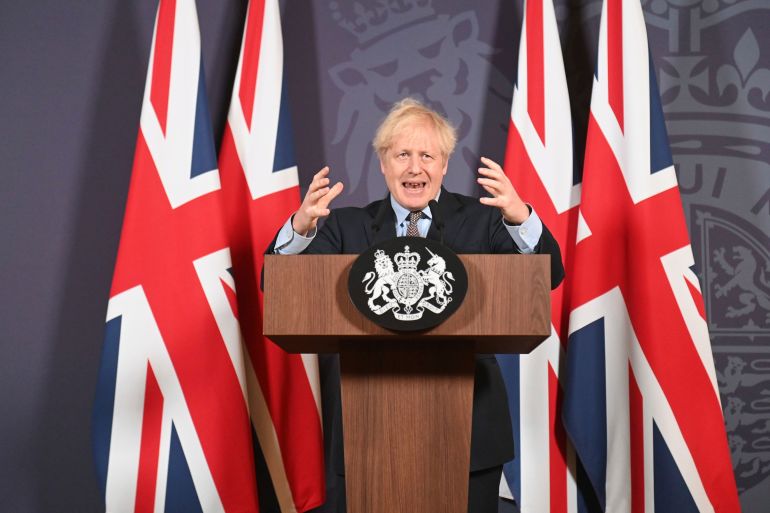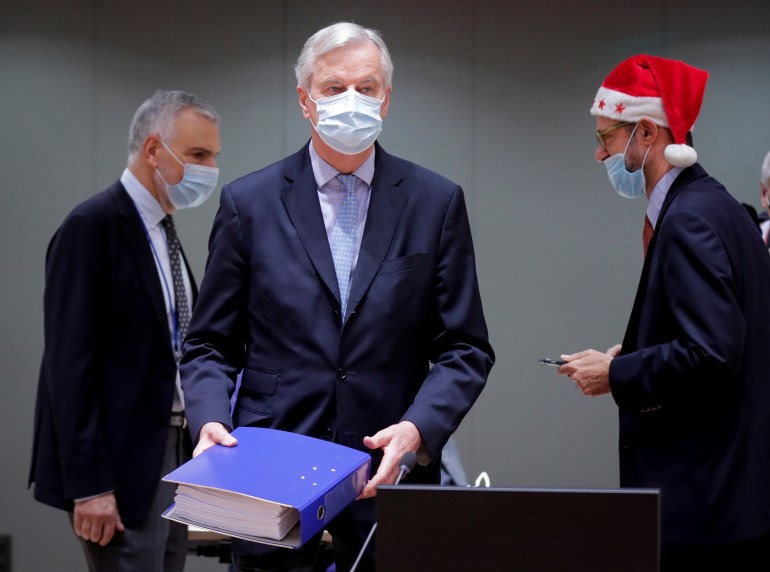Brexit deal: What happens next and what will change on January 1? | Brexit News
London, United Kingdom – The clock, as Michel Barnier said, is no longer ticking.
Some four-and-a-half years after a slim majority of Britons voted to take the United Kingdom out of the European Union’s orbit, the UK and the EU finally signed a historic trade deal on Thursday.
The 660 billion pounds ($900bn)-a-year pact will determine the terms of the pair’s relationship from 2021 onwards and was reached after months of missed deadlines, acrimonious posturing and fraught negotiations marred by divisions over fishing rights, competition rules and governance issues.
The deal came exactly one week before the UK is due to exit the EU’s single market and customs union on December 31, when the Brexit transition period ends.
Announcing the breakthrough agreement, Barnier, the EU’s chief Brexit negotiator, on Thursday said it was a “day of relief” tinged with “some sadness as we compare what came before with what lies ahead”.
Here is what you need to know:
What happens next?
The UK and the EU parliaments must move quickly to ratify the deal, which is yet to be published but thought to be about 1,500 pages long.
It is expected that both legislative bodies will sign off on the agreement. However, due to the short window of time left in the transition period, it will not be fully ratified until next year.
British Prime Minister Boris Johnson plans to put the agreement to the UK Parliament for a vote on December 30.
MPs are expected to give their approval to the pact. Johnson’s governing Conservative Party enjoys a sizeable parliamentary majority and the opposition Labour Party has confirmed it will back the deal, as the only alternative to a chaotic no-deal Brexit scenario.
But the EU Parliament has ruled out rushing through ratification before the end of this year. The legislative body will instead analyse the pact before deciding whether to approve it in 2021.
This process is unlikely to stop the deal coming into effect on January 1, as EU law includes a mechanism for agreements to be provisionally applied without its parliament’s consent – if approved by the 27 member states.
EU diplomats began assessing the deal on Friday – Christmas Day – and are expected to take two or three days to weigh its terms.
Member states will then need to agree before December 31 to approve provisional implementation in order for the deal to come into effect as planned at the beginning of next year.
What will change on January 1?
The deal will ensure goods can continue to travel between the UK and the EU without tariffs or quotas from the beginning of 2021, smoothing trade worth hundreds of billions of pounds – and euros – a year between the pair.
It is supplemented by other agreements on a range of other issues including energy, transport, and police and security cooperation.
But even with the deal settled, some friction will affect UK-EU trade from January 1.
More rules and increased bureaucracy will come into effect once the UK sits outside of the bloc’s single market and customs union, and analysts warn they are unlikely to result in “smooth sailing” ahead.
“Although there will be no tariffs on goods moving between the UK and EU, there will be new non-tariffs barriers – new checks and paperwork – which will make it more costly to do trade,” Maddy Thimont Jack, a specialist Brexit researcher at the UK’s Institute for Government, told Al Jazeera.
The new rules and requirements could also disrupt the flow of goods, causing problems for businesses which rely on just-in-time supply chains and, in the worst-case scenario, food shortages in the UK if border points become clogged.
 Johnson said the UK had taken back control of its laws, borders, and fishing waters under the deal [Paul Grover/Pool Photo via AP]
Johnson said the UK had taken back control of its laws, borders, and fishing waters under the deal [Paul Grover/Pool Photo via AP]The pact will meanwhile see the UK leave the EU’s common fisheries policy, reducing the bloc’s access to its waters.
Fish became a totemic issue during the trade talks, despite the industry accounting for less than 0.1 percent worth of the UK’s gross domestic product (GDP).
But the deal does not include provisions on financial services, which make up four-fifths of the UK economy, meaning blanket access for the UK’s financial sector to the EU’s single market will end on January 1.
It also contains no mutual recognition of professional qualifications, meaning British doctors, architects, vets, and engineers, among others, will have to seek recognition in the member state they wish to practise in from the beginning of next year.
The rules governing how Britons and Europeans travel, live and work will all fundamentally change, with freedom of movement between the UK and the EU coming to an end as of January 1.
UK citizens will need a visa to stay for longer than 90 days in EU member states in any 180-day period and EU pet passports will no longer be valid.
“Leaving the single market and customs union essentially means a lot more red tape. This is both for businesses looking to trade with the EU but also for people travelling there on holiday, with pets, or who may want to move there in the future,” Thimont-Jack said.
“It will be impossible to minimise all disruption – but the most important thing will be, when people or businesses get things wrong, explaining what they need to do instead and making it as easy as possible to do so,” she added.
Other changes to take effect from January 1 will see the UK no longer bound by judgements made by the European Court of Justice, no longer participate in the Erasmus student exchange programme and no longer have automatic access to key EU security databases.
What has the reaction to the deal been?
Johnson on Thursday triumphantly hailed striking what he called “the biggest trade deal yet”, adding that the UK had taken back control of its laws, borders, and fishing waters.
He urged Britons to make the most of what he called the country’s soon-to-be status of a “newly and truly independent nation”, and in a nod to the EU, said the UK would remain its ally and “number one market”.
EU officials struck a more sombre tone, with European Commission President Ursula von der Leyen stating that the pair’s parting was “such sweet sorrow”.
“We have finally found an agreement. It was a long and winding road but we have got a good deal to show for it,” von der Leyen said on Thursday. “It is time to leave Brexit behind. Our future is made in Europe,” she added.
Across the continent, meanwhile, many capitals were quick to express their relief that a no-deal divorce had been averted, with an array of leaders issuing statements welcoming the agreement.
Who ‘won’ in the end?
Both sides will sell the agreement as a win, though in reality, each made compromises to secure an agreement.
The EU can claim to have protected the integrity of its single market, while Johnson can tell British voters he delivered on his election-winning promise to “get Brexit done” and take the UK out of the bloc, with a trade deal to boot.
Anand Menon, director of the UK in a changing Europe think-tank, said the pact amounted to a “pretty good outcome for both sides” given their respective ambitions.
“In substantive terms, the EU have got a deal that allows the goods trade to keep going, which is where their surplus is, and puts all sorts of impediments in the way of services, which is where the UK’s surplus is,” Menon told Al Jazeera.
“And for Boris Johnson, getting this through with as little political pushback as possible is what this is about,” he added.
“It was never about maximising the economic benefits or anything like that, it was about respecting the red lines, and I think, so far, the omens are all very, very good for him [Johnson].”
 The EU’s Barnier discussed the deal with diplomats from the bloc’s member states at a Christmas Day meeting [Olivier Hoslet/Pool via Reuters]
The EU’s Barnier discussed the deal with diplomats from the bloc’s member states at a Christmas Day meeting [Olivier Hoslet/Pool via Reuters]However, Menon also cautioned that “one way or another”, Brexit would continue to “haunt” British politics, in particular, for years to come.
He predicted there would be “all sorts of issues” thrown up by the implementation of the trade deal, pointing to potential disruption to trade, the agreement’s protocol for Northern Ireland and also its possible effect on Scottish politics – where the ruling nationalist party is pushing for a second referendum on independence over Brexit – as areas of difficulty ahead.
Northern Ireland, a constituent part of the UK, will effectively remain in the EU’s customs union and single market for goods after December 31 in order to prevent the erection of a hard border between it and the neighbouring Republic of Ireland, an EU member.
“Brexit is basically like throwing a massive brick into a very still pond,” Menon said. “There will be loads and loads and loads of ripples for ages.”
